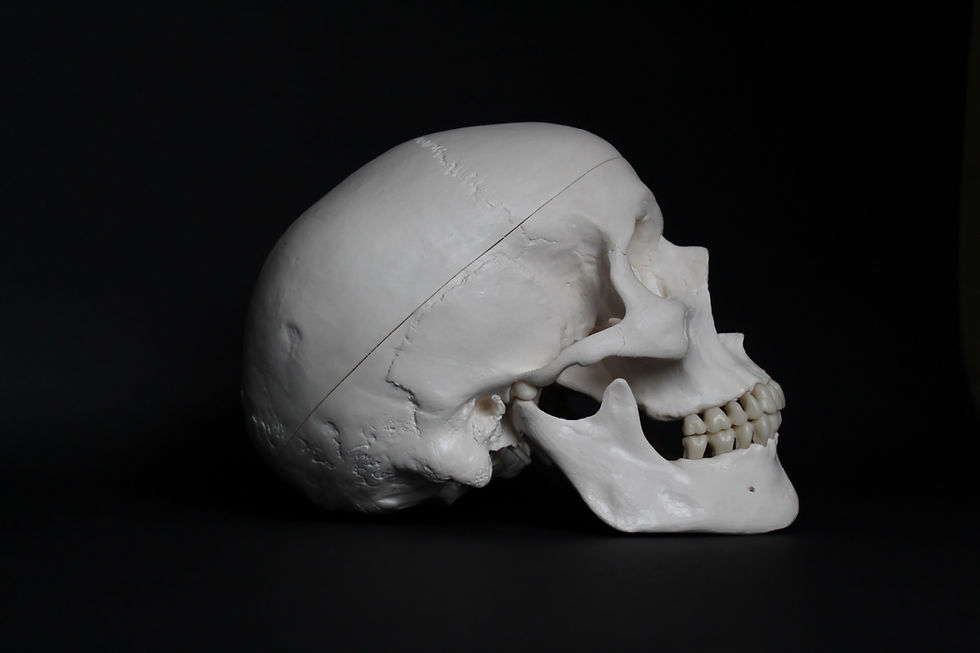Have You Ever Had the Muscles of Your Jaw Assessed?
- Orie Quinn
- Apr 17
- 3 min read

The Hidden Tension You Didn't Know Was There
There’s a tension many people carry and never think about—until it speaks loudly enough that it can’t be ignored. It shows up as a clicking sound when you chew, a headache that won’t go away, tightness at the base of your skull, or even difficulty sleeping. You may have chalked it up to stress, posture, or getting older—but have you ever had the muscles of your jaw assessed?
That space just below your cheekbones, beside your ears, beneath your chin—this small area holds an incredible amount of influence over your entire body.
The Anatomy of the Jaw
Let’s talk about the anatomy briefly. There are several key muscles involved in jaw function, and each plays a vital role:
Masseter: One of the strongest muscles in your body (pound for pound), it runs from your cheekbone to your lower jaw. It’s the primary muscle used in chewing.
Temporalis: A fan-shaped muscle along the side of your head, just above your ears. It helps you clench and retract your jaw.
Medial and Lateral Pterygoids: These sit deeper, behind the jaw. They help move your jaw side to side and assist in opening and closing.
Digastric, Mylohyoid, and other suprahyoid muscles: Located beneath the jaw, they play a role in swallowing, breathing, and stabilizing the head and neck.
These muscles don’t work in isolation. They are part of a greater system—connected to the neck, the cranium, the airway, the shoulders, and even your posture all the way down to your feet.
The Symptoms of Jaw Dysfunction
When these muscles become tight, imbalanced, or overworked, a chain reaction begins:
Headaches or migraines
Clicking, locking, or pain when opening your mouth
Ear ringing (tinnitus) or ear pressure
Neck and shoulder pain
Facial pain or sensitivity
Difficulty sleeping or snoring
Tooth grinding (bruxism)
Anxiety or tension you just can’t seem to shake
I’ve seen patients walk in with back pain that was never about their back. I’ve seen anxiety ease when tension was released from the jaw. I’ve seen people regain deep sleep for the first time in years just by addressing the tension behind the teeth.
The Weight of an Unbalanced Jaw
We speak, we eat, we breathe—all through the gateway of the jaw. When something is off here, it quietly pulls on our health from behind the scenes. You may not even notice the change—until your posture begins to tilt, your sleep starts to feel lighter, or your energy begins to dip by mid-afternoon.
Jaw dysfunction can affect your digestion (by impacting how and what you chew), your nervous system (by stimulating stress-related reflexes), and even your emotional state (by keeping the body in low-grade fight-or-flight).
And yet, almost no one ever has these muscles assessed.
The Power of Applied Kinesiology & Myofascial Release
This is where the beauty of Applied Kinesiology and myofascial release comes in.
With Applied Kinesiology, I can test the function and strength of each of the jaw muscles individually—seeing which are overactive, underactive, or neurologically inhibited. It allows for a personalized map of what’s happening in your system. No guesswork.
Then, using myofascial release, I can gently release tension from the muscles, fascia, and even the deeper connective tissue surrounding the jaw and neck. This helps restore movement, improve alignment, and calm the nervous system—leading to real, lasting change.
Sometimes, we find that jaw dysfunction is tied to an old trauma: a fall, a whiplash injury, or even emotional stress. When we uncover those connections and work through them, people often say they feel “lighter,” like something finally let go.
And it did.
The Simplicity of Getting Started
Health doesn’t have to be complicated. Sometimes it starts with a single question like,“Have you ever had your jaw muscles assessed?”
If you’re dealing with chronic tension, facial pain, poor sleep, or unexplained stress—this may be the piece that’s been overlooked.
🌀 Curious to learn more? I’d be happy to answer your questions.📞 Book a free 15-minute consult here
🌿 Or, if you’re ready to take the next step and start your healing:💻 Book your first session now







Comments